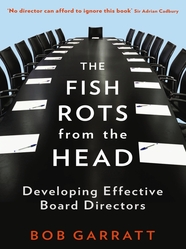 Several weeks ago, I posted a critique of the NACD's 2014 list of burning issues for boards. The list indicated that the main priorities of US directors were compliance and operational matters. I suggested that directors needed to place more emphasis on activities that impacted the future performance of the companies they are responsible for. To my surprise, the muse garnered considerable attention and comment, indicating (to me at least!) that the subject of board performance is topical for many people. This week, Grant Thornton, a global advisory and audit firm, published a similar list for UK directors, of the areas that need to be addressed by boards in 2014:
Like the NACD's list, the Grant Thornton list sounds a tone of compliance and control. The assumption seems to be that if boards report accurately, control the CEO and manage risk, then they are discharging their duties well. Sorry, but I don't accept this. Structures and controls do not guarantee effective governance, nor can they assure company continuance. They did not avert the corporate collapses of the early 2000s, the global financial crisis of 2008–2009, nor some of the more recent failures of governance. While the monitoring of past performance is important, the primary focus of boards needs to be on the road ahead. Boards—and their advisors—need to wake up to their obligations, to ensure company performance is optimised in accordance with the shareholder's wishes. Rarely, if ever, does the rearview mirror provide the best view if the task is to drive forward.
1 Comment
A couple of months ago, I was asked to consider submitting a paper to the British Academy of Management (BAM), for presentation at the annual conference (in Belfast, Northern Ireland this year). The BAM conference is attended by over 850 delegates, from academia and the working world. Once I got over the surprise of being asked to contribute to such an esteemed conference, the challenge of choosing a topic loomed large in my mind.
The topic I have selected plays to the foundation of my current research work: that of finding a way to move beyond the limitations of the research methods that have been favoured by many governance researchers. Researchers are really good at counting and measuring things, but the process of digging deeper, to explain why something is as it is (in my case, how boards influence company performance) has proved to be much harder. The aim of the paper I have written is two-fold:
The paper was submitted last night. The ideas in it are somewhat contentious, so it will be interesting to see how the paper is received, and whether it is accepted on the programme. Please contact me if you'd like a sneak-peak at the abstract now, or to be sent a copy of the paper after it is presented. Please excuse my silence over the last ten days or so. I have been concentrating on several important research tasks and some family matters, and this has precluded me writing any musings. To give you an idea, here's a list of some of my activities from the last week:
I'm hoping things will settle down a little next week, so I can finalise the BAM paper; spend some more time on data analysis; start thinking about the slidedeck for my presentation to the International Conference on Management, Leadership and Governance in Boston, Mass. on 20–21 March; and, resume normal transmission on Musings. (*) Companies Alpha and Beta are the two companies who have provided me with access to observe their boards in action and collect governance data. Both are quasi-public, high-growth organisations of substance domiciled in New Zealand. Anonymity is a condition of research so all other information that may enable the companies to be identified is withheld.  Over the last few months, I have re-read quite a few books and articles about models of governance, to see how my doctoral research might build on the suggestions of earlier contributors. Many years ago my father taught me that building on the work of others is smart, but only when the prior work is solid—a stable foundation being crucial to anything that follows. The "Learning Board", developed and suggested by Bob Garratt nearly twenty years ago, is one of the models that has captured my attention. Garratt published his suggestions in a profoundly titled book The Fish Rots from the Head (3rd edition). Garratt highlights four key tasks of directors within the context of a board's lifecycle:
He suggests that boards need to balance four intellectual viewpoints simultaneously in order to achieve the four key tasks. When they do, overall effectiveness can be enhanced.
I found this to be very helpful, because it provides a useful context for my work (an investigation of how boards can influence company performance, and the influence of strategic decision-making). Regardless of my efforts though, I commend Garratt's book to aspiring and established directors. It's easy to read, and logical in its approach to the topic. News emerged today that Peter Campbell, CEO of Brackenridge, an intellectual disability facility, has resigned after five months of investigations and media scrutiny. Tragically, three residents died at the facility last year. There have been a series of complaints relating to safety as well.
Clearly, there have been operational problems at Brackenridge—the review concluded that management had been distant and unresponsive. Notwithstanding this, I suspect there has been a failure of governance as well. Some important questions that need to be asked are:
Superficially, the board appears to have been quite passive, to the extent it may have failed to discharge its legal and moral duties effectively. Notwithstanding the remedial plan now in place, the performance of the board needs to be reviewed. Weaknesses need to be identified and changes made, to improve the process of governance and quality of oversight at Brackenridge. The residents and their families deserve as much. I read two straight talking articles this week that provided welcome relief from the rather superficial and politically correct reporting that seems to dominate newspapers like the Dominion Post these days:
Thank you for Messrs Morgan, Guthrie and du Fresne for your forthright articles which, I suspect, reflect the views of the majority of New Zealanders. The time for the silent majority to push back on those self-indulgent folk who make an art-form of political correctness and living off the state is upon us. The pages of history are littered with stories of business mergers and acquisitions—some of which successfully achieve the intended aims after consummation, most of which do not. Stories of failed attempts are far less common, especially when the suitor's advances are confidential. However, one failed attempt, of which news broke in the Australian business press over the weekend, merits further comment, particularly because it involves a corporate board that has been accused of a series of bungles of late.
The headline story concerns a proposal made by department store titan Myer to merge with its competitor David Jones. While the companies are currently trading profitably, pressure is starting to mount on both businesses as new competitors including on-line traders emerge. In October 2013, the Myer board presented a confidential merger proposal, claiming that operational savings of $85M per year would ensue. It was formally rejected by the David Jones board in November. The existence of the proposal, and David Jones' rejection of it, remained confidential—until recently. Several questions must be asked as a result of this situation. Did the David Jones board act in the best interests of the company by rejecting the proposal, especially given claims that the situation was a "bloody fiasco" and that the directors were "just trying to protect their position"? Further, why did two David Jones directors buy shares the day after the proposal was received? (The ASIC has determined not to investigate the share transaction, despite it appearing to be, superficially at least, an instance of insider trading.) The shareholders of both companies deserve better than this. Both companies have long and proud histories. They are publicly-listed, so the respective boards have a duty of care to keep shareholders (and the market) informed of material developments. Is the David Jones board on borrowed time? Perhaps. The response of shareholders, and the ASIC and ACCC, will be very interesting to observe. |
SearchMusingsThoughts on corporate governance, strategy and boardcraft; our place in the world; and other topics that catch my attention. Categories
All
Archives
May 2024
|
|
Dr. Peter Crow, CMInstD
|
© Copyright 2001-2024 | Terms of use & privacy
|

